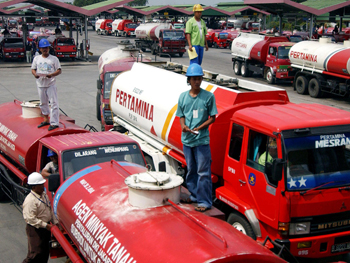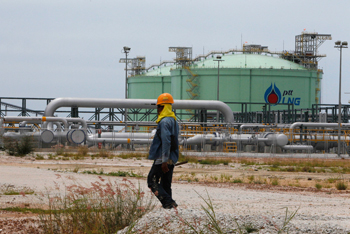
 Pertamina ... needing more refineries
Pertamina ... needing more refineries
Fuel demand in Indonesia already reached 1.6 million barrels per day (mbpd). However, oil refining capacity only stands around 1.1 mbpd, implying that 43 per cent of fuel consumption in Indonesia needs to be imported from abroad.
Oil refining capacity today is roughly the same as it was 15 years ago, meaning that there has been limited progress in development of Indonesia’s downstream oil industry. Without adding refining capacity, Indonesia is on track to become the world’s largest fuel importer within the next decade.
Indonesia currently has six oil refineries, all operated by the nation’s state-owned energy company Pertamina. Pertamina CEO Dwi Soetjipto, who was recently removed, continuously emphasised the need to boost investment in Indonesia’s downstream oil industry. Stagnating investment is reflected by the fact that Pertamina has not built a new oil refinery in the last quarter of a century.
It is often mentioned that Indonesia should take an example of Singapore where oil refinery capacity stands at 1.5 mbpd, while domestic fuel demand is only around 150,000 bpd.
It should also make investment into Indonesia’s upstream oil sector more attractive when the crude oil output can be processed domestically. The reason why Indonesia whole oil industry has more-or-less been in a state of decline over the past two decades is due to a lack of investment in oil exploration. Weak investment in this sector is generally attributed to tough bureaucracy and an unclear and uncertain regulatory and legal framework.
Provided the construction of two new oil refineries – one in Bontang (East Kalimantan) and one in Tuban (East Java) – is completed by 2023 (each good for 600,000 bpd) then Indonesia’s total installed oil refining capacity will touch around 2 mbpd in the same year.
However, this will most likely not be enough to meet domestic demand.







































































